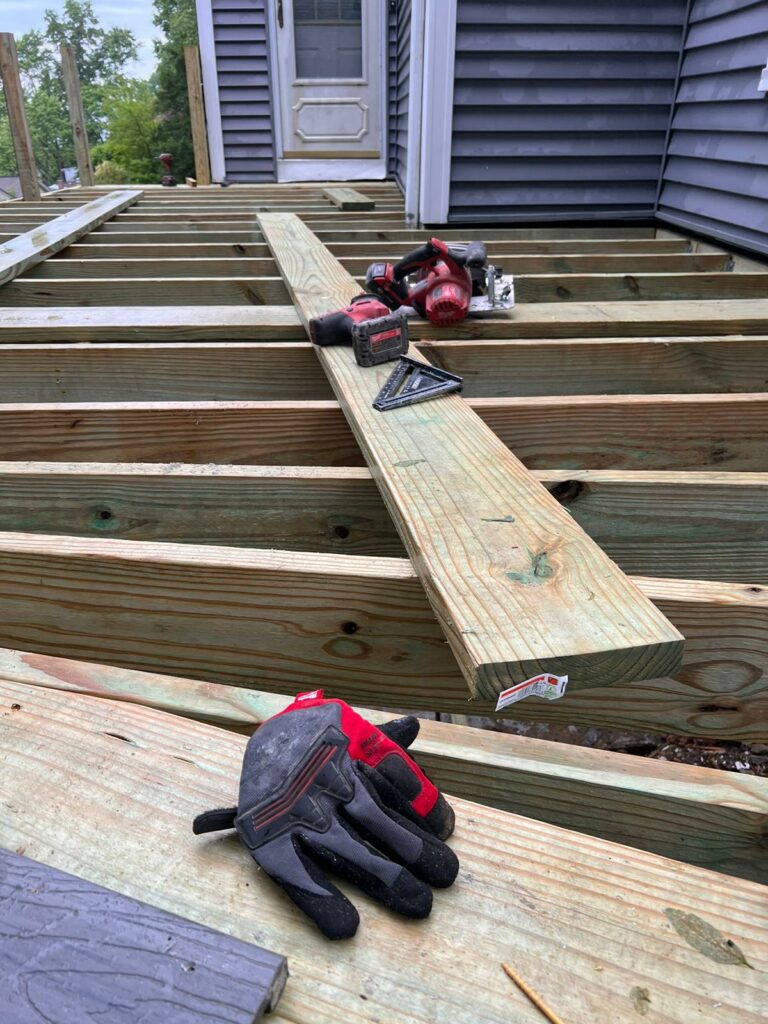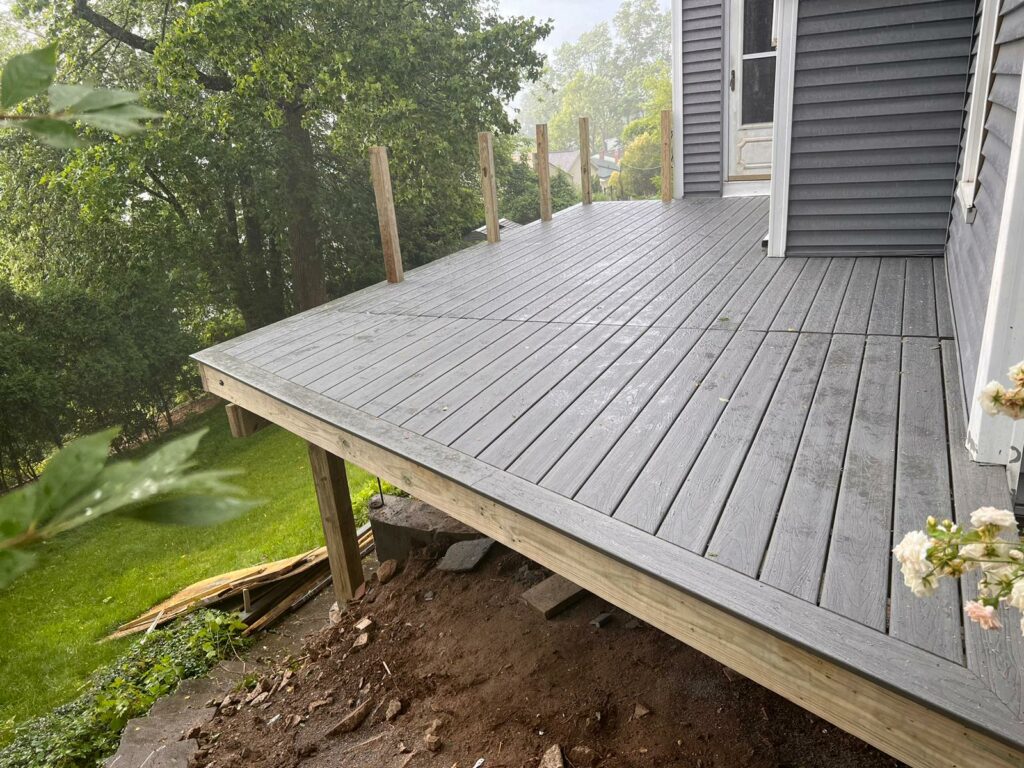When talking to westchester deck builders about choosing a decking material, the debate between vinyl and wood has been ongoing for many years. Both options have their merits, but which one is truly superior? In this discussion, we will examine several key factors that can help determine the answer. From durability and longevity to maintenance and upkeep, aesthetics and design options, environmental impact, and cost and budget considerations, we will delve into each aspect to shed light on the question at hand. By exploring these factors, we aim to provide a comprehensive analysis that will assist you in making an informed decision for your decking needs. So, let’s dive in and uncover the truth about vinyl decking versus wood. Vinyl decking offers exceptional durability and longevity compared to wood, making it a reliable and long-lasting choice for outdoor spaces. One of the key advantages of vinyl decking is its resilience and weather resistance. Vinyl decks are designed to withstand harsh weather conditions, including extreme heat, cold, and moisture. Unlike wood, vinyl decking does not warp, crack, or splinter when exposed to these elements, ensuring a longer lifespan for your outdoor space. Another benefit of vinyl decking is its low maintenance nature. Unlike wood decks that require regular staining, sealing, and painting, vinyl decks are virtually maintenance-free. They do not need to be sanded, stained, or sealed to maintain their appearance and structural integrity. This not only saves you time and effort but also reduces the overall cost of upkeep. In addition to being low maintenance, vinyl decking also offers various low maintenance options. For instance, some vinyl decks come with a protective coating that makes them resistant to stains, scratches, and fading. This means you can enjoy your outdoor space without worrying about spills or wear and tear. Maintaining a vinyl deck is a straightforward process that requires minimal effort and upkeep. Unlike wood, vinyl decking does not require regular staining, sealing, or painting. To keep a vinyl deck looking its best, all that is needed is regular cleaning with mild soap and water. This simple maintenance routine helps to prevent the buildup of dirt, grime, and stains. Additionally, vinyl decks are highly resistant to weather conditions such as rain, snow, and UV radiation. The vinyl material is designed to withstand the elements without warping, cracking, or fading, making it a durable choice for outdoor spaces. One of the advantages of vinyl decking is its low repair costs. Compared to wood, vinyl is less prone to damage from moisture, insects, and rotting. In the event of any damage, individual vinyl boards can be easily replaced without having to replace the entire deck. This reduces the need for costly repairs and extends the lifespan of the deck. When it comes to aesthetics and design options, homeowners have a wide range of choices to enhance their outdoor spaces with vinyl decking. Vinyl decking offers a plethora of color choices to suit different preferences and styles. Whether homeowners desire a classic wood-like appearance or a vibrant and modern look, they can find vinyl decking in various shades and finishes. From warm earth tones to cool greys and blues, there is a color option to complement any outdoor theme. In addition to color choices, vinyl decking also offers texture options. Homeowners can choose from a range of textures that mimic the look and feel of natural wood. Whether they prefer a smooth surface or a more textured one, vinyl decking can be customized to meet their specific design preferences. Moreover, vinyl decking allows for creative design possibilities. It can be easily cut and shaped to create unique patterns and designs, giving homeowners the freedom to create a truly customized outdoor space. With vinyl decking, homeowners can achieve the aesthetic they desire while enjoying the low-maintenance benefits of this material. One important aspect to consider in comparing vinyl decking and wood is their respective environmental impacts. When it comes to sustainability benefits, wood decking has the upper hand. Wood is a renewable resource, as it can be harvested and replanted. Vinyl decking, on the other hand, is made from non-renewable fossil fuels, such as petroleum or natural gas. Another factor to consider is the carbon footprint of each material. Wood decking has a lower carbon footprint compared to vinyl decking. This is because wood is a natural material that absorbs carbon dioxide from the atmosphere during its growth. In contrast, the production of vinyl decking involves energy-intensive processes that release greenhouse gases, contributing to climate change. Furthermore, wood decking can be recycled or repurposed at the end of its lifespan, reducing waste and conserving resources. Vinyl decking, however, is not easily recyclable and often ends up in landfills, adding to the environmental burden. To make an informed decision about decking options, it is essential to consider the cost and budget implications. One of the factors to consider is the installation process. When it comes to vinyl decking, the installation process is relatively straightforward and can often be completed in a shorter amount of time compared to wood decking. This can result in cost savings as less labor is required for installation. Another aspect to consider is the lifespan comparison between vinyl decking and wood. Vinyl decking is known for its durability and longevity. It is resistant to rot, mold, and insect damage, which can extend its lifespan compared to wood decking. This means that homeowners may not need to replace or repair their vinyl deck as frequently, resulting in potential long-term cost savings. However, it’s important to note that vinyl decking material can have a higher upfront cost compared to wood decking. The initial investment may be higher, but considering the potential savings in maintenance and repair costs over the lifespan of the deck, vinyl decking can be a cost-effective choice in the long run. In extreme weather conditions, such as high heat or freezing temperatures, special considerations and additional maintenance may be required for vinyl decking. These may include regular cleaning, sealing, and protection measures to ensure durability and longevity. Vinyl decking offers the option to paint or stain it to match specific color preferences, providing flexibility in design choices. However, it is important to consider the durability and pros and cons of vinyl decking before making a decision. The installation process of vinyl decking compared to wood decking does not require specialized tools or professional contractors. It can be easily installed by homeowners with basic tools and DIY skills. Cleaning techniques and recommended products are crucial for maintaining the appearance and durability of vinyl decking. Regularly sweeping and rinsing with a hose is recommended, while mild soap and water can be used for tougher stains. When considering vinyl decking, it is important to be aware of safety precautions and concerns such as slip resistance and fire resistance. Slip-resistant surfaces and fire-resistant materials can help ensure the safety of users. In conclusion, vinyl decking offers several advantages over wood decking. It is more durable and has a longer lifespan, requiring less maintenance and upkeep. Vinyl decking also provides a wide range of design options and is environmentally friendly. Additionally, it is cost-effective in the long run. One interesting statistic is that vinyl decking can last up to 50 years, while wood decking typically lasts only 10-15 years, making vinyl a more sustainable and practical choice.Is Vinyl Decking Better Than Wood?

Durability and Longevity
Maintenance and Upkeep
Aesthetics and Design Options
Environmental Impact

Cost and Budget Considerations
Frequently Asked Questions
Are There Any Special Considerations or Additional Maintenance Requirements for Vinyl Decking in Extreme Weather Conditions, Such as High Heat or Freezing Temperatures?
Can Vinyl Decking Be Painted or Stained to Match a Specific Color or Design Preference?
How Does the Installation Process of Vinyl Decking Compare to Wood Decking? Are Specialized Tools or Contractors Required?
Are There Any Specific Cleaning Products or Techniques Recommended for Maintaining the Appearance and Durability of Vinyl Decking?
Are There Any Specific Safety Precautions or Concerns to Be Aware of When Using Vinyl Decking, Such as Slip Resistance or Fire Resistance?
Conclusion